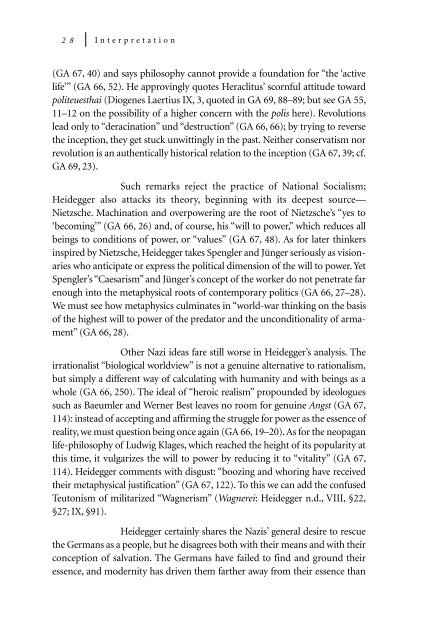Beyond Struggle and Power: Heidegger's Secret ... - Interpretation
Beyond Struggle and Power: Heidegger's Secret ... - Interpretation
Beyond Struggle and Power: Heidegger's Secret ... - Interpretation
Create successful ePaper yourself
Turn your PDF publications into a flip-book with our unique Google optimized e-Paper software.
2 8 <strong>Interpretation</strong><br />
(GA 67, 40) <strong>and</strong> says philosophy cannot provide a foundation for “the ‘active<br />
life’” (GA 66, 52). He approvingly quotes Heraclitus’ scornful attitude toward<br />
politeuesthai (Diogenes Laertius IX, 3, quoted in GA 69, 88–89; but see GA 55,<br />
11–12 on the possibility of a higher concern with the polis here). Revolutions<br />
lead only to “deracination” und “destruction” (GA 66, 66); by trying to reverse<br />
the inception, they get stuck unwittingly in the past. Neither conservatism nor<br />
revolution is an authentically historical relation to the inception (GA 67, 39; cf.<br />
GA 69, 23).<br />
Such remarks reject the practice of National Socialism;<br />
Heidegger also attacks its theory, beginning with its deepest source—<br />
Nietzsche. Machination <strong>and</strong> overpowering are the root of Nietzsche’s “yes to<br />
‘becoming’” (GA 66, 26) <strong>and</strong>, of course, his “will to power,” which reduces all<br />
beings to conditions of power, or “values” (GA 67, 48). As for later thinkers<br />
inspired by Nietzsche, Heidegger takes Spengler <strong>and</strong> Jünger seriously as visionaries<br />
who anticipate or express the political dimension of the will to power. Yet<br />
Spengler’s “Caesarism” <strong>and</strong> Jünger’s concept of the worker do not penetrate far<br />
enough into the metaphysical roots of contemporary politics (GA 66, 27–28).<br />
We must see how metaphysics culminates in “world-war thinking on the basis<br />
of the highest will to power of the predator <strong>and</strong> the unconditionality of armament”<br />
(GA 66, 28).<br />
Other Nazi ideas fare still worse in Heidegger’s analysis. The<br />
irrationalist “biological worldview” is not a genuine alternative to rationalism,<br />
but simply a different way of calculating with humanity <strong>and</strong> with beings as a<br />
whole (GA 66, 250). The ideal of “heroic realism” propounded by ideologues<br />
such as Baeumler <strong>and</strong> Werner Best leaves no room for genuine Angst (GA 67,<br />
114): instead of accepting <strong>and</strong> affirming the struggle for power as the essence of<br />
reality, we must question being once again (GA 66, 19–20). As for the neopagan<br />
life-philosophy of Ludwig Klages, which reached the height of its popularity at<br />
this time, it vulgarizes the will to power by reducing it to “vitality” (GA 67,<br />
114). Heidegger comments with disgust: “boozing <strong>and</strong> whoring have received<br />
their metaphysical justification” (GA 67, 122). To this we can add the confused<br />
Teutonism of militarized “Wagnerism” (Wagnerei: Heidegger n.d., VIII, §22,<br />
§27; IX, §91).<br />
Heidegger certainly shares the Nazis’ general desire to rescue<br />
the Germans as a people, but he disagrees both with their means <strong>and</strong> with their<br />
conception of salvation. The Germans have failed to find <strong>and</strong> ground their<br />
essence, <strong>and</strong> modernity has driven them farther away from their essence than
















